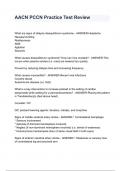Pccn abg interpretation - Study guides, Class notes & Summaries
Looking for the best study guides, study notes and summaries about Pccn abg interpretation? On this page you'll find 10 study documents about Pccn abg interpretation.
All 10 results
Sort by
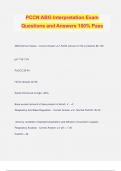
-
PCCN ABG Interpretation Exam Questions and Answers 100% Pass
- Exam (elaborations) • 4 pages • 2024
- Available in package deal
-
- $10.49
- + learn more
PCCN ABG Interpretation Exam Questions and Answers 100% Pass ABG Normal Values - Correct Answer ️️ -PaO2 (amount of O2 in plasma) 80-100 pH 7.35-7.45 PaCO2 35-45 HCO3 (bicarb) 22-26 SaO2 (O2 bound to Hgb) >95% Base excess (amount of base present in blood) -2 - +2 Respiratory Acid Base Regulation - Correct Answer ️️ --Normal PaCO2: 35-45 -done by ventilation (inspiration/expiration) and diffusion (movement of gases) Respiratory Acidosis - Correct Answer ️️ -pH < 7.35 ...
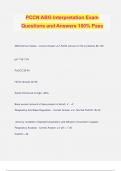
-
PCCN ABG Interpretation Exam Questions and Answers 100% Pass
- Exam (elaborations) • 4 pages • 2024
- Available in package deal
-
- $10.49
- + learn more
PCCN ABG Interpretation Exam Questions and Answers 100% Pass ABG Normal Values - Correct Answer ️️ -PaO2 (amount of O2 in plasma) 80-100 pH 7.35-7.45 PaCO2 35-45 HCO3 (bicarb) 22-26 SaO2 (O2 bound to Hgb) >95% Base excess (amount of base present in blood) -2 - +2 Respiratory Acid Base Regulation - Correct Answer ️️ --Normal PaCO2: 35-45 -done by ventilation (inspiration/expiration) and diffusion (movement of gases) Respiratory Acidosis - Correct Answer ️️ -pH < 7.35 ...
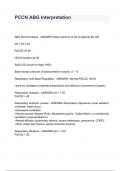
-
PCCN ABG Interpretation
- Exam (elaborations) • 3 pages • 2024
-
- $7.99
- + learn more
ABG Normal Values - ANSWER-PaO2 (amount of O2 in plasma) 80-100 pH 7.35-7.45 PaCO2 35-45 HCO3 (bicarb) 22-26 SaO2 (O2 bound to Hgb) >95% Base excess (amount of base present in blood) -2 - +2 Respiratory Acid Base Regulation - ANSWER--Normal PaCO2: 35-45 -done by ventilation (inspiration/expiration) and diffusion (movement of gases) Respiratory Acidosis - ANSWER-pH < 7.35 PaCO2 > 45 Respiratory Acidosis: causes - ANSWER--Respiratory depression (over sedation, overdose, head in...
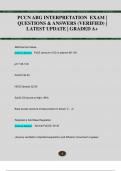
-
PCCN ABG INTERPRETATION EXAM | QUESTIONS & ANSWERS (VERIFIED) | LATEST UPDATE | GRADED A+
- Exam (elaborations) • 5 pages • 2024
- Available in package deal
-
- $11.49
- + learn more
PCCN ABG INTERPRETATION EXAM | QUESTIONS & ANSWERS (VERIFIED) | LATEST UPDATE | GRADED A+PCCN ABG INTERPRETATION EXAM | QUESTIONS & ANSWERS (VERIFIED) | LATEST UPDATE | GRADED A+
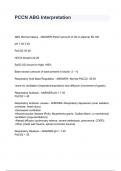
-
PCCN ABG Interpretation
- Exam (elaborations) • 3 pages • 2024
- Available in package deal
-
- $7.99
- + learn more
PCCN ABG Interpretation
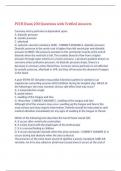
-
PCCN Exam 200 Questions with Verified Answers,100% CORRECT
- Exam (elaborations) • 73 pages • 2024
- Available in package deal
-
- $12.99
- + learn more
PCCN Exam 200 Questions with Verified Answers Coronary artery perfusion is dependent upon: A. diastolic pressure B. systolic pressure C. afterload D. systemic vascular resistance (SVR) - CORRECT ANSWER A. diastolic pressure Diastolic pressure in the aortic root is higher than left ventricular end-diastolic pressure (LVEDP), the pressure exerted on the ventricular muscle at the end of diastole when the ventricle is full. This enables blood to flow from a higher pressure through open arter...
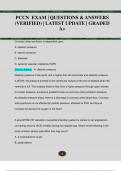
-
PCCN EXAM | QUESTIONS & ANSWERS (VERIFIED) | LATEST UPDATE | GRADED A+
- Exam (elaborations) • 118 pages • 2024
- Available in package deal
-
- $21.49
- + learn more
1 PCCN EXAM | QUESTIONS & ANSWERS (VERIFIED) | LATEST UPDATE | GRADED A+ Coronary artery perfusion is dependent upon: A. diastolic pressure B. systolic pressure C. afterload D. systemic vascular resistance (SVR) Correct Answer: A. diastolic pressure Diastolic pressure in the aortic root is higher than left ventricular end-diastolic pressure (LVEDP), the pressure exerted on the ventricular muscle at the end of diastole when the ventricle is full. This enables blood to flow from a ...
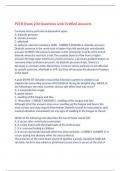
-
PCCN Exam 200 Questions with Verified Answers,100% CORRECT
- Exam (elaborations) • 73 pages • 2024
-
- $12.99
- + learn more
PCCN Exam 200 Questions with Verified Answers Coronary artery perfusion is dependent upon: A. diastolic pressure B. systolic pressure C. afterload D. systemic vascular resistance (SVR) - CORRECT ANSWER A. diastolic pressure Diastolic pressure in the aortic root is higher than left ventricular end-diastolic pressure (LVEDP), the pressure exerted on the ventricular muscle at the end of diastole when the ventricle is full. This enables blood to flow from a higher pressure through open arter...
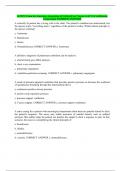
-
ACNPC Exam for American Association of Critical-Care Nurses (AACN) Certification Corporation with VERIFIED ANSWERS
- Exam (elaborations) • 54 pages • 2023
-
- $16.49
- + learn more
A critically ill patient has a living will in the chart. The patient's condition has deteriorated, but the spouse wants "everything done," regardless of the patient's wishes. Which ethical principle is the spouse violating? a. Autonomy b. Beneficence c. Justice d. Nonmaleficence CORRECT ANSWER a. Autonomy A definitive diagnosis of pulmonary embolism can be made by a. arterial blood gas (ABG) analysis. b. chest x-ray examination. c. pulmonary angiogram. d. ventilation-perfusion sca...

Study stress? For sellers on Stuvia, these are actually golden times. KA-CHING! Earn from your study resources too and start uploading now. Discover all about earning on Stuvia



